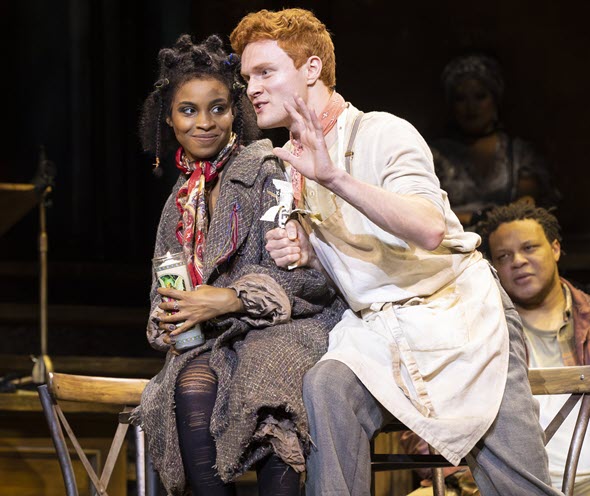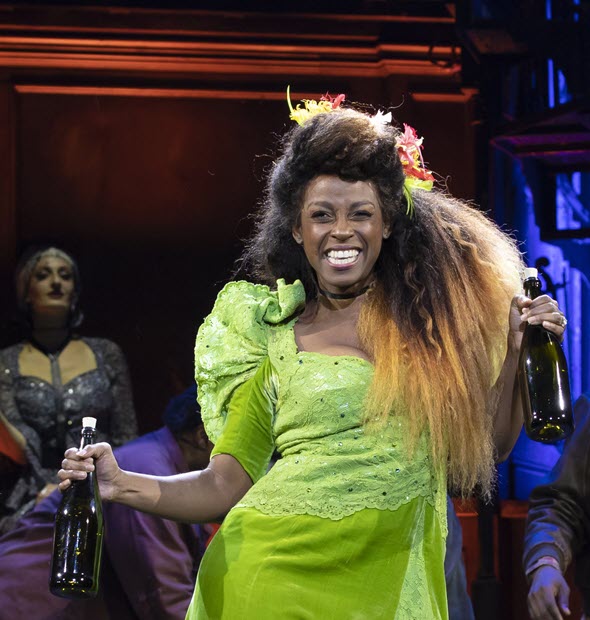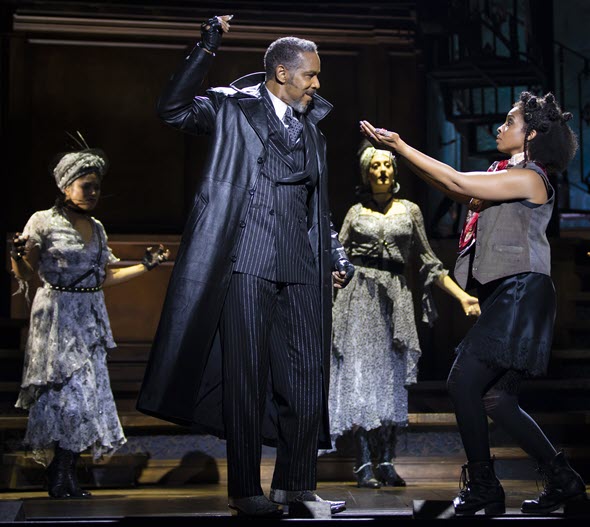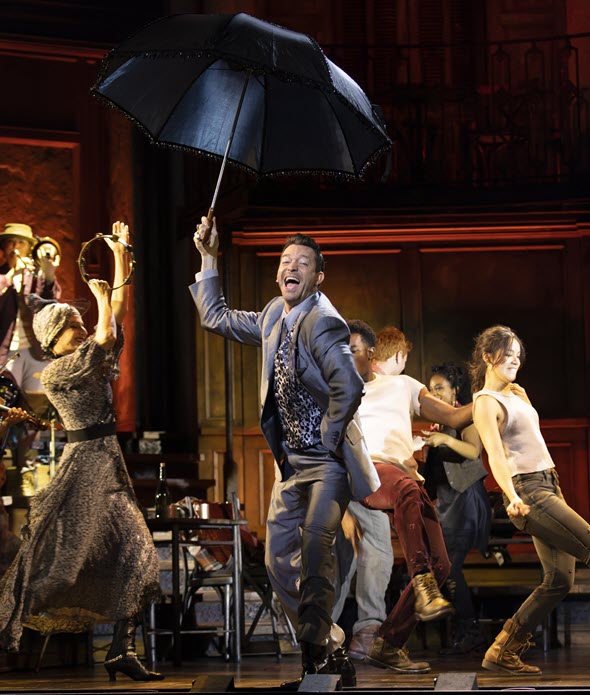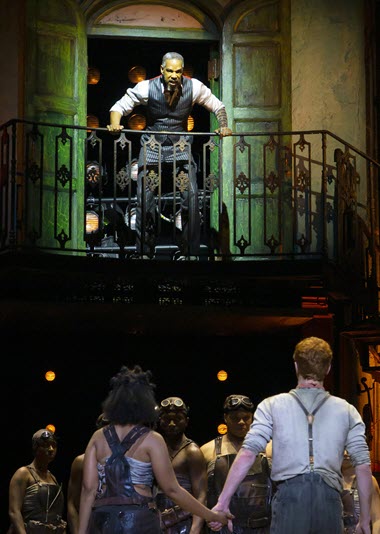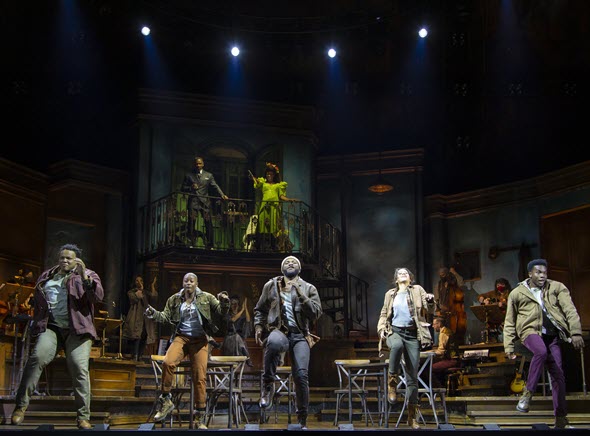Musical ‘Hadestown,’ updating Orpheus myth, spins dark modernist tale of two dreamy kids
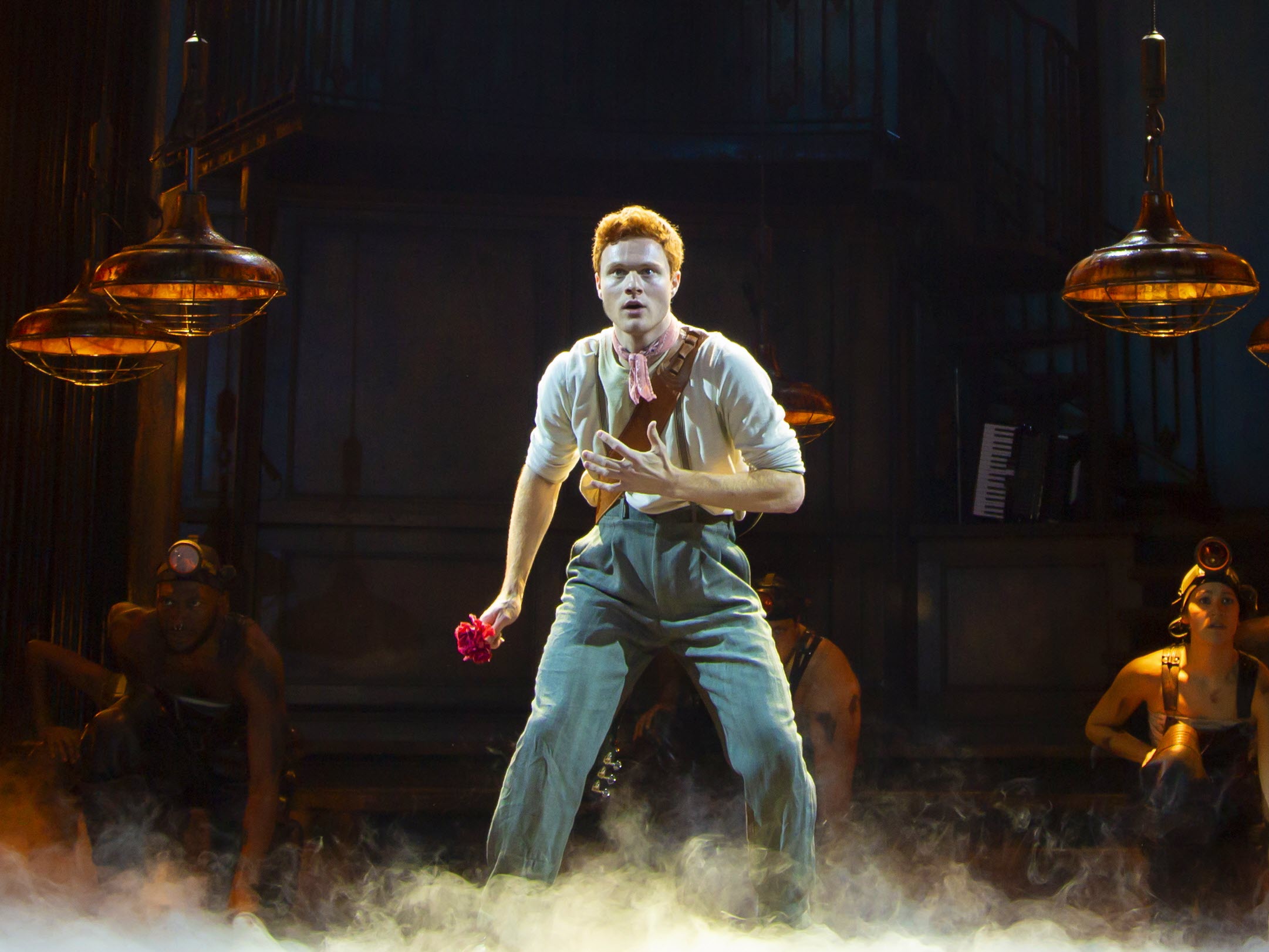
Nicholas Barasch is Orpheus, in love but obsessed with his unfinished song, in “Hadestown.” (Photos by T. Charles Erickson)
Review: “Hadestown,” created by Anaïs Mitchell. Presented by Broadway in Chicago, at CIBC Theatre through March 13. ★★★
By Lawrence B. Johnson
To say the musical “Hadestown” puts a bleak, dark modern spin on the ancient Greek myth of Orpheus and Eurydice would be quite an understatement. This gritty and cynical albeit musically ample show, winding up a tour stop here under the aegis of Broadway in Chicago, sends mixed – if not muddled – messages about human nature while also recentering the story’s tragedy. Though “Hadestown” is packed with vivid characters and provocatively edgy songs, taken as a whole, as an existential screed, it doesn’t bear very close scrutiny.
In this telling, which reminds me not a little of Puccini’s opera “La bohème,” Orpheus is, well, a bohemian songsmith with writer’s block. He has this song going, but can’t finish it. Into the bistro where he hangs out walks the girl Eurydice, a hapless vagrant looking for something to eat. Orpheus is lovestruck and soon wins her over. Now, if she wouldn’t mind waiting in the corner while he finishes his song, they can have a great life together. But it’s winter. Eurydice, who can see that she’s essentially invisible to her distracted new love, withers and dies and migrates to the Underworld. When Orpheus finally wraps up his song, he looks around for the love of his life only to learn that, surprise, she’s dead. He resolves to make his own way to the Underworld and bring her back, etc., etc. The rest is pretty much like the original tale. It almost works out but not quite, and she’s lost forever.
That’s what happens. But how it all comes to pass is the nouveau and quite appealing narrative overlay of “Hadestown,” which assembles several key figures of Greek mythology in a thoroughly modern vibe. Hades, ruler of the Underworld, is married to the beautiful Persephone, goddess of spring, who once spent her life in the natural world making all things bountiful. After Hades swept her off to the Underworld, her sadness moved him to grant her six months each year upon the earth, when she could restore its beauty as well as its bounty. “Hadestown” adds the intrigue of a marriage now on the rocks. Persephone feels neglected. Hades, that devil, is a rover.
The likewise estranged Eurydice meanwhile is starving and freezing. Hades, always looking for new souls to add to his workforce, basically offers her a contract: warmth and food plus long term security, in exchange for an open-ended commitment to dwell with him. Eurydice signs.
One more Greek immortal fills out the roster: Hermes. The fabled messenger takes the form here of a cool dude in an elegant suit. He’s our narrator and guide. I saw the incomparable André De Shields, age 70+, as the original Hermes on Broadway pre-Covid. Nobody is going to top that very soon. Still, the tall, suave Levi Kreis lends this touring show a suitably oily sheen. In the best sense, Kreis is a showman, a strutter, the embodiment of finesse, irresistible.
No less might also be said of Kevyn Morrow’s urbane Hades, whose authoritative presence and resonant bass-baritone voice are the stuff of kingly characters. In every sense, Hades meets his match in Kimberly Marable’s aggrieved but also imperious – and vocally resplendent – Persephone. The further the show moves along, the more compelling Marable becomes as a figure of real depth and substance. Oddly, Morgan Siobhan Green’s blowing leaf Eurydice never achieves that fullness, those dimensions of credibility. She brings a polished singing voice to the role, but her Eurydice seems a bit wan for a modern woman.
What shall I say, then, about Nicholas Barasch’s whiny vocalizing as Orpheus? That’s where his music lies, I suppose, in a tenor very high falsetto range, but even so I didn’t hear much body weight in all the pallid pleading of this feckless Orpheus. And it is specifically in this show’s concept of Orpheus as a narcissistic artiste that it loses its dramatic gravitas. When, after Orpheus’ quest to retrieve Eurydice from the Underworld has failed, and he’s back in the bistro scratching out another song, Hermes says, essentially: “Well, there it is – a tragedy, but we keep coming back to this great story perhaps in hope that it will turn out differently.” Of the original, I would say, yes, exactly. Let us hear again the tale of broken-hearted Orpheus. But do I really want to see this tape of an immature, self-centered adolescent replayed?
The music of “Hadestown” is generous, imaginative and well made, not least for Hades’ enslaved workers and three chorus-like figures called the Fates. The sets are handsome and ambitious, too, especially the Underworld scene with its workers’ circle and its forbidding elevator of no return. The show begins and ends with its ringing anthem “The Road to Hell.” I’m afraid it’s the one paved with good intentions.
Related Link:
Performance location, dates and times: Details at TheatreInChicago.com

